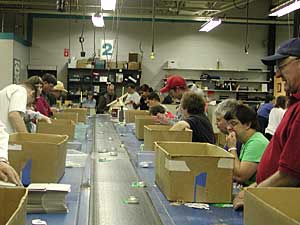|
Photos
Your Voice
|
Nice work if you can get it
November 20, 2003
 |
| West Central Industries employs 300 disabled workers in their sheltered workshops. State and county budget cuts might mean the workshops will be phased out. (MPR Photo/Annie Baxter) |
Willmar, Minn. — The cavernous halls of West Central Industries' workshops buzz with activity as workers assemble tape dispensers, cut wood, or sort items for recycling.
Twenty-seven year old Tracy Westman is busy at work. She's sprightly with bright eyes and a bouncy blond ponytail. Today her job is to sort the different grades of recyclable glass and paper.
"We separate the 2's from the 1's," Westman explains.
 | |||
About one-third of West Central's clients work in sheltered workshops. The rest hold jobs in the community, which employment counselors help them find.
Tracy Westman says she tried working outside the sheltered workshop.
"I had jobs out in the community but they haven't lasted," Westman say. "I just was too slow."
The workers are paid less than they would be in the community. But the work gives many a sense of purpose. And the sheltered workshops are also crucial to West Central Industries' financial health. Contracts with private companies cover more than half of the organization's operating costs.
The sheltered workshops generate revenue, but state and county funding makes their operation possible. And that funding is increasingly hard to come by. That's partly because state budget cuts have stripped counties of their financial resources.
Oliver Krage is the Program Director at West Central Industries. He says funding cuts may force some of the biggest changes they've ever seen in their program.
|
I had jobs out in the community but they haven't lasted. I just was too slow.
- Tracy Westman, disabled worker |
"Over the past 15 or 20 years, the funding has been consistent in terms of methodology," Krage notes. "It's just been with state budget reductions of the past 6 months, that the county is looking at new formulas that could be used that would result in reduced expenditures on their part."
Larry Kleindl, Director of Family Services in Kandiyohi County, says there's a distinction in the source of the money.
"It's not a direct cut. It's a change in the funding stream we're looking at," Kleindl says. "So we're looking at having resources come from the state or federal government, versus county dollars."
But that change in the funding stream still amounts to a cut, because the money lost from the county often can't be matched dollar for dollar with other sources.
At West Central Industries, this funding crunch will affect the sheltered workshops most directly.
Some state and federal funding policies don't support them because the workshops are regarded as outmoded. That's an idea put forward by many advocates of the disabled, who say sheltered workshops don't promote independence or integration into the community.
But others say the workshops still combat high unemployment rates among disabled adults.
Patty Nefstead, cooordinator of the Kandiyohi branch of Arc Minnesota, says center-based work is an important safety net.
 | |||
"And hopefully it would be the last option after you've tried many other options and they haven't been successful," Nefstead says. "But then you find that disabled people are successful in that workshop."
As of December 1, county funding will no longer be available for five people in West Central Industries' sheltered workshops. For now, the organization will use its own resources to keep those people employed.
When possible, West Central will continue to help place its disabled clients at jobs outside in the community.
Several clients have worked in the cafeteria at Ridgewater College. Manager Patty Vienne says she's taken referrals from West Central for 10 years now.
"We find working with West Central Industries really nice," Vienne says. "They work with their people, and help us train, and we're very happy with it."
When this scenario works, it seems to serve everyone well.
But not all employers are willing to train workers with special needs. Jobs aren't always available. And some disabled workers don't thrive in such settings, even given their best effort.
In that case, there are other state-funded programs for disabled people to enroll in, which don't always involve employment.
But if it's work they want, sheltered workshops may no longer be an option.
|
News Headlines
|
Related Subjects
|
